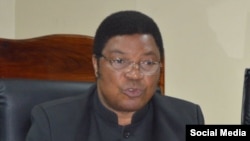A majority of parliamentarians in Tanzania Thursday approved Majaliwa Kassim Majaliwa as the new prime minister to lead the government’s business in the lawmaking body. He has pledged to work with the opposition.
President John Magufuli, officially sworn in as the new president on November 5, appointed Majaliwa, who was a junior minister for former president Jakaya Kikwete. Magufuli is expected to soon name members of his cabinet.
Professor Xavery Lwaitama of the Josiah Kibira University College says it was not a surprise that Majaliwa was approved, because the ruling Chama Cha Mapinduzi (CCM) lawmakers are a majority in parliament.
“He was endorsed by parliament by a large majority, but of course parliament is dominated by CCM. The prime minister’s name was suggested by the president, so I can’t see how members of parliament from CCM could have voted him down even if they had wished it not so. In a way, I think that it is in the early days to determine whether he is popular or not popular,” said Lwaitama.
Opposition supporters have questioned whether Majaliwa has the experience that qualifies him to lead the government business in parliament, having been a junior minister in the previous administration.
Lwaitama says the new prime minister would have to prove to Tanzanians that he is up to the task following the confidence reposed in him by President Magufuli.
“He was a junior minister for a long time. He was dealing with the nitty gritty of primary and secondary education in the [former] prime minister’s office, which deals with the local government and regional administration, together with health issues as well as some emergencies and so on. Otherwise, I can’t say he has been tried and tested in any complicated situations of governance," said Lwaitama.
He says it appears Magufuli, who was regarded as hardworking and a no-nonsense cabinet minister in previous administrations, wants to change the way things have been done in successive governments.
This came after Magufuli ordered restrictions on foreign travel for all government officials. He also announced plans to change the way things are done by warning public sector workers who fail to do their jobs that they would be kicked out.
All these, his supporters say, are aimed at instilling accountability and efficiency among civil servants, as he promised during his campaign in the run up to the October general election.
Professor Lwaitama says it seems Magufuli’s choice for prime minister was a demonstration that he was looking for somebody with a clean slate, and who would not be a political liability down the road.
“This is an indication of the difficulties of him being able to act independently of the system that he is bequeathed with because first he has to select someone from members of parliament who are elected from the constituencies,” said Lwaitama.
“His hand was also tied in some traditions that are not constitutional, but they had to be adhered to. For instance you could see that [Majaliwa] is from southern Tanzania, [so] it would have been very difficult for him to choose someone from the Lake Zone, where he himself comes from because that would have raised eyebrows. So his hands were already tied.”




